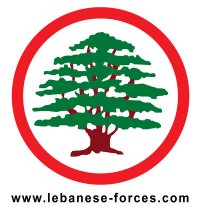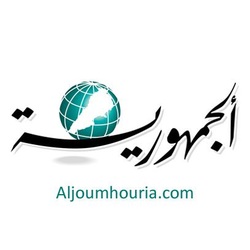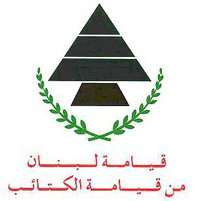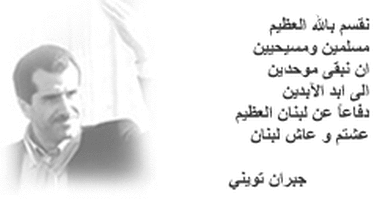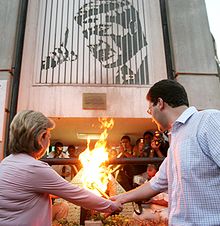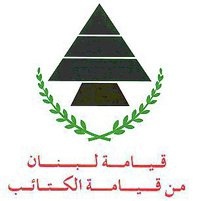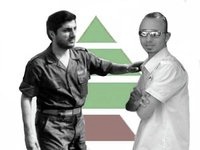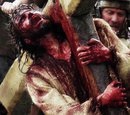
قرروا صلب يسوع من جديد وذبح ابنائه بالفعل نفسه،،
لأننا على صورته ومثاله ولأن الحق يرى من قسماتي وجهنا
لأنه كل هذا،،قرروا اضطهادنا وقتلنا وترويعنا.
.........
ويح هذا العالم يا يسوع !
طردوك من بيت لحم والناصرة والقدس ...فجئت جبال لبنان وقانا وصيدا... واقمت عندنا،واليوم حتى عندنا تأمل يا يسوع
أمسيت غريباً مشرداً في ما بيننا..لأنا اصبحنا بدورنا غرباء عنك وعن أنفسنا وعن مسيحييتنا ،،،
لأنا هال عالم الشر أن ينهض ،،
كسوا رأسنا بالشوك،واغمدوا الحراب في قلوبنا وصدرنا فانسكب دمنا كالشلال الصبيب حتى غدا الأفق أورجوانيا في رائعة النهار،،،
لأننا على صورته ومثاله ولأن الحق يرى من قسماتي وجهنا
لأنه كل هذا،،قرروا اضطهادنا وقتلنا وترويعنا.
.........
ويح هذا العالم يا يسوع !
طردوك من بيت لحم والناصرة والقدس ...فجئت جبال لبنان وقانا وصيدا... واقمت عندنا،واليوم حتى عندنا تأمل يا يسوع
أمسيت غريباً مشرداً في ما بيننا..لأنا اصبحنا بدورنا غرباء عنك وعن أنفسنا وعن مسيحييتنا ،،،
لأنا هال عالم الشر أن ينهض ،،
كسوا رأسنا بالشوك،واغمدوا الحراب في قلوبنا وصدرنا فانسكب دمنا كالشلال الصبيب حتى غدا الأفق أورجوانيا في رائعة النهار،،،
بشير الجميّل (10 نوفمبر 1947 - 14 سبتمبر 1982)، سياسي وقائد عسكري لبناني. تم انتخابه لرئاسة لبنان ولكنه اغتيل قبل تسلمه المنصب.
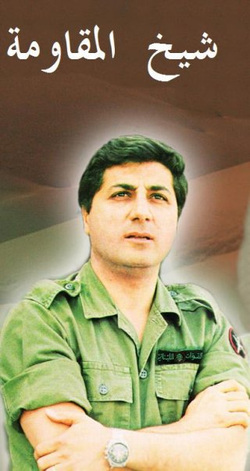
In 1970, Bachir was briefly kidnapped by Palestinian militants in Lebanon and taken to the Tel al-Zaatar refugee camp. He was released 8 hours later. Then in 1971, Bachir was appointed as an inspector of the military branch of the Phalange, who formed a militia to counter the influence of what they saw as a growing Palestinian threat to Lebanon.
Bachir decided to form a militia and take matters into his own hands because the Lebanese Army was divided and uncapable of fulfilling its duties and protecting the Lebanese.
With tensions rising between the Palestinian Liberation Organization, which was based in Lebanon, and numerous Christian Lebanese parties, among them the Phalange, clashes broke out on several occasions. The PLO gained support from many Lebanese, in particular Sunni Muslims, Druze, and leftists. These pro-Palestinian Lebanese formed the Lebanese National Movement. In 1975, two Phalangists accompanying Pierre Gemayel were killed when unidentified gunmen, assumed to be Palestinian militants in a speeding car, fired at them. This was seen as an attempt on the life of Phalangist leader Pierre Gemayel. Consequently, the Phalangists, led by Bachir, retaliated hours later by ambushing a bus carrying 27 Palestinians and killed them. This sparked the Lebanese Civil War. Later in 1975, Gemayel was accused by the LNM of being responsible for the Black Saturday massacre of Palestinians and Lebanese Muslims. According to Phalange member Karim Pakradouni, Bachir admitted that while being in an emotional state for the killing of four Phalangists earlier that day, he ordered his militiamen into the streets. Bachir claimed that when the situation developed into something he did not agree with and civilians were being killed, he tried to stop the killings but failed to.[4]
Christian East Beirut was ringed by heavily fortified Palestinian camps from which kidnappings and sniping against Lebanese civilians became a daily routine. Christian East Beirut became besieged by the PLO camps, with severe shortages of food and fuel. This unbearable situation was remedied by the Phalanges (most notably the BG Squad that was led by Bachir) and their allied Christian militias as they besieged the Palestinian camps embedded in Christian East Beirut one at a time and brought them down. The first was on 18 January 1976 when the heavily fortified Karantina camp, located near the strategic Beirut Harbor, was invaded : About 1,000 PLO fighters and civilians were killed.[5] The Palestinian PLO and al-Saika forces retaliated by attacking the isolated defenseless Christian town of Damour about 20 miles south of Beirut on the coast, during the Damour massacre in which 1,000 Christian civilians were killed and 5,000 were sent fleeing north by boat, since all roads were blocked off..[6] The Maronites retaliated with the invasion of the Tel al-Zaatar camp that same year (The camp was under siege for quite some time and the Maronites weren't able to invade it until Bachir and his group of "Commandos" arrived and came up with a plan for the invasion that was successfully executed)..[7] Bachir, with his Phalangists, also fought battles against the PLO for control over the hotels. The most important battle won by the Phalange was most notably the battle for control over the Holiday Inn due to its important strategic location. Before that battle, the Holiday Inn had been occupied by the PLO.[8]
In 1976, with the death of William Hawi, Bachir became head of the Phalangist militia. Later that year, he became a leading member of the Lebanese Front, a coalition of several Christian parties, and commander of their main militia, the Lebanese Forces. The militia not only opposed the PLO but also the Syrian troops, who had entered Lebanon at first to assist in defeating Palestinian militants, before turning into occupiers.
Bachir led his troops in the infamous “Hundred Days War” in Lebanon in 1978, in which the Lebanese Forces successfully resisted the Syrian shelling and attacking of Eastern Beirut for about three months before an Arab-brokered agreement forced the Syrians to end the siege. Syrians took high buildings such as Burj Rizk Achrafieh and Burj El Murr using snipers and heavy weapons against civilians. The soldiers stayed for 90 days. Another major clash took place near the Sodeco area in Achrafieh where the Lebanese Forces fought ferociously and led the Syrian army out of the Rizk Building.[9] At this time, Israel was the primary backer of the Lebanese Front’s militia.
In 1981, Zahle, the biggest Christian town in the East, confronted one of the biggest battles – both military and political – between the Lebanese Forces and the Syrian occupying forces. The Lebanese Forces was able to confront them even though there was a big mismatch in military capabilities and was able to reverse the result of the battle of 1981. This victory was due to the bravery of the inhabitants and 92 Lebanese Forces soldiers (L.F Special Forces: The Maghaweer) sent from Beirut. The Syrian occupying forces used all kind of weapons (heavy artillery, tanks, war planes…) against a peaceful town, and they cut all kind of backup that may come from the Mountain. Regardless of the very bad weather and heavy bombing, convoys were sent in the snow to Zahle. Two Lebanese Forces soldiers died on a hill due to bad weather, they were found later holding each other… till they died. The battle of Zahle gave the Lebanese Cause a new perspective in the International Communities, and the victory was both military and diplomatic. It made the Leadership of President Bashir Gemayel much stronger because of his leadership and important role in this battle. The battle started in April the 2nd 1981, and finished with a cease fire and Lebanese Police were sent to Zahle. The 92 Lebanese Forces heroes returned to Beirut on the 1st of July 1981.[10]
Of course Bachir also led the Lebanese Forces to countless victories other than the ones mentioned above. However, the ones mentioned above are the most important and had the most impact on the Lebanese situation
Following the killing of many Phalangist members, in addition to a senior Phalangist by members of the Marada militia, which was led by fellow member of the Lebanese Front, Tony Frangieh, Bachir called for a meeting to decide on what to do about this situation. At first, the decision was to capture Tony Frangieh, and force him to surrender the members of the Marada miltia who killed the Phalangists. However, there was concerns about the consequences of this move. So, the decision was changed after many talks between the Phalangists present at the meeting. It was decided that the goal of the operation would be to capture the members of the Marada militia who killed the Phalangists and it would be done on Tuesday to be sure that Tony Frangieh would have finished his weekend vacation and left Ehden. On June 23 1978, Bachir sent a squadron of his men led by Samir Geagea and Elie Hobeika to Ehden, but what Bachir did not know is that Tony Frangieh never left Ehden since his car didn't work. As soon as the squadron arrived, bullets were flying all over their heads, so they retaliated and this led to the killing of Tony Frangieh and his family, in addition to tens of members of the Marada militia. Bachir was very angry about what happened, but he stood by his men. [11][12]
In 1980, in an attempt to unify the Lebanese Forces under his direct command and in what he dubbed Unification of the Rifle, Bachir sent his troops to the town of Safra, where Dany Chamoun and members of his Tigers militia were vacationing. With full support from Dany’s father, former president Camille Chamoun, the Tigers under the control of Elias el Hannache were exterminated in what was later named Safra massacre. Dany’s life was spared and he sought refuge in West Beirut, but Camille Chamoun’s support of the attack was interpreted as him believing that his son’s militia was getting too out of control.[13]
Israel invaded Lebanon in 1982. Defense Minister of Israel, Ariel Sharon, met with Bachir months earlier, telling him that the Israeli Defense Force were planning an invasion to uproot the PLO threat to Israel and to move them out of Lebanon. [14] While Bachir did not control Israel’s actions in Lebanon, the support they gave the Lebanese Forces, militarily and politically, angered many Lebanese Muslims and leftists.
Bachir tried to move the PLO out of Lebanon without any Israeli intervention. So, he met with Hani Al-Hassan (representative of the PLO) and told him that Israel will enter and wipe them out. Bachir told him that they have the chance to leave peacefully. Hani left and no reply was given to Bachir.[15]
Israel invaded and the PLO was rooted out of Lebanon in August of 1982. By now, Bachir had announced his candidacy for president. He was backed by the United States, who sent peacekeeping troops to oversee the withdrawal of the PLO from Lebanon. Bachir had requested that they stay longer to keep Lebanon stable until he could reunite it, but his request was denied. On August 23, 1982, being the only one to declare his bid, Bachir was elected president.
On 1 September 1982, two weeks before his assassination and only one week after his election, Bachir met the Israeli Prime minister Menachem Begin in Nahariya. During the meeting, Begin demanded that Bachir sign a peace treaty with Israel as soon as he took office in return of Israel's earlier support of Lebanese Forces and he also told Bachir that the IDF will stay in South Lebanon if the Peace Treaty wasn't directly signed. Bachir was furious at Begin and told him that the Lebanese Forces didn't fight for seven years and that they didn't sacrifice thousands of soldiers to free Lebanon from the Syrian Army and the PLO so that Israel can take their place. The meeting ended in rage and both sides weren't happy with each other.[16]
Begin was reportedly angry at Bachir for his public denial of Israel's support. Bachir refused the immediate peace arguing that time is needed to reach consensus with Lebanese Muslims and the Arab nations. Bachir was quoted telling David Kimche, the director general of the Israeli Foreign Ministry, few days earlier, “Please tell your people to be patient. I am committed to make peace with Israel, and I shall do it. But I need time - nine months, maximum one year. I need to mend my fences with the Arab countries, especially with Saudi Arabia, so that Lebanon can once again play its central role in the economy of the Middle East.”[17][18]
In an attempt to fix the relations between Bachir and Begin, Ariel Sharon met secretly with Bachir in Bikfaya. In this meeting, they both agreed that, after 48 hours, the IDF will cooperate with the Lebanese Army to force the Syrian Army out of Lebanon. After that is done, the IDF would peacefully leave the Lebanese territory. Concerning the Peace Negotiation, Sharon agreed to give Bachir time to fix the internal conflicts before signing the negotiation. The next day, Begin's office issued a statement saying that the issues agreed upon between Bachir and Sharon were accepted. However, Bachir was assassinated before the plans were put into action.[19]
As Bachir explained on several occasions, the objectives of international politics take nothing into consideration but their own interests. Thus, no State will undertake any action or abstain from doing so, unless this is in their obvious interests.
It is therefore up the the Lebanese to promote Lebanon’s interests alone, because, as Bachir said “The beginning of the end will come if we are divided upon ourselves. We should overstep all petty considerations. The enemy’s only weapon consists in breaking our ranks and pitting us against each other... Let us rise above selfishness and partisan politics, and be one single united party, the party of Lebanon.”
Bachir then defined the conditions required to enable the Lebanese people to realize their goals and safeguard their interests. The first of these was for the Lebanese to assert their existence as Lebanese, for, as he said “If we are not consequent with ourselves, and cannot assert our presence, then nobody will be with us...”. The second of these conditions was that the Lebanese should know what they wanted, “otherwise, he said, we cannot go out into the world and tell people : This is what we want”... But if the Lebanese first assert their existence, it would be a simple matter for them to go anywhere and express their wishes chiefly among these to demand the restoration of their violated rights. There should be a clear and frank understanding between them about the constituent elements of the Lebanese existence, “so that the decision should be one; we must agree with each other on our Lebanese identity, and on what should be done in order to retrieve our soil...”. Bachir summarized his own ideas and his concept of the contents of Lebanese identity. The cornerstone of this was the sole and undivided allegiance to Lebanon. And he repeated what he had said at a previous meeting : “None of us should try to have a foreign ‘outlet’ of cast a look across the borders, for this would cast doubts on his national loyalty and allegiance to Lebanon...”.
And he assorted allegiance to Lebanon with two other principles, the first being the preservation of the country’s unity and territorial integrity, and the second precluding the domination of one section of the Lebanese by another.
He expressed these principles clearly, saying : “We are against any form of partition of Lebanon, and against any combination that might grant one party domination over another... for the essence of the Lebanese question is that every person in the Orient suffering from persecution should find a haven of security and freedom in this country.”
Bachir was not unmindful of the values which should constitute the starting point for all Lebanese in their quest for the fulfillment of their aspirations. He also specified the means to attain these, after he had defined the principle of Lebanese identity. It was up to the Lebanese to be frank and open with each other, bearing in mind that nations are built on principles. And honorable principles should be proclaimed publicly and openly, not hidden under a bushel... A clear outlook combined with frankness, wisdom and truthfulness would pave the way for the Lebanese to their national objectives. These values led Sheikh Bachir to say : “We have always been accustomed to proclaim what we want loudly, and to take the straight path towards the clear objectives that we seek to attain. Let us shun the crooked path and devious methods, and not look for noon at sunset. Especially in view of the fact that our actions and our behavior contain nothing that we should be ashamed about, and should therefore not arouse suspicion in others. We have always spoken the plain unvarnished truth, and avoided prevarication and deceit.”
It is clear that the presence in Lebanon of citizens who believe in this country, whose absolute allegiance to it is undoubted and undivided, who know their national duties and aims, and who pursue these aims honorably, is an asset , and constitutes a basis for their dealings with each other. Such qualities in the Lebanese citizen also forms a basis for their dealings with other countries, and with groups concerned by the Lebanese question. Such a desirable position would enable us, alone, to “save Philip Habib from the quagmire in which he has been wallowing for so long,” said Bachir. “Indeed, said Bachir, it would also save Israel, Syria, Palestinians, the Lebanese Muslim, the Christians, and all those involved in this crisis from the pitfalls into which they have fallen. Only we can save ourselves and others from the quicksand's that engulf them here...”
Thus, it is true to say that many of Sheikh Bachir Gemayel’s attitudes in domestic affairs can better be understood when correlated with some factors of foreign policy of which he was fully cognizant. But it would similarly be correct to say, by juxtaposition, that many of his attitudes in foreign policy were inspired by Lebanon’s internal situation... for in this matter did Bashir elaborate his principles of foreign policy, to form an extension of domestic affairs and events occurring on the local scene. In this, he also contrived to defend his internal policy through his contacts abroad, and to put across the true picture of events in Lebanon. Bachir wanted Lebanon to remain united. But he realized that those who wanted to solve the Middle-East problem at the expense of Lebanon were doing their level best to partition it. So he fought partition by unification. In this connection, he expressed his views frankly, saying : “We are in a position today - and I say we, alone - to proclaim a separate State. This is a fond hope entertained by others, in order to justify their establishment of a ‘settlement state’ within our borders... but this hope has been dashed to the ground. We shall not make such a move, not today, not tomorrow, not ever.”
Bachir further realized that the provocation of sectarian strife could be one of the means used by the enemy, in fact, the only means, to partition Lebanon by creating ‘mini sectarian states’ on part of its soil. To forestall this, he called on all the Lebanese to ensure and safeguard the basic right to existence of every citizen on Lebanese soil, regardless of his denominational identity or creed.
And first and foremost, the right to exist means that no Lebanese should attack another Lebanese just because he belongs to a different religion than his own. Expressing this principle in clear terms, Bachir said : “Lebanon belongs to the Muslims and to the Christians equally, but within the framework of the Constitution, and this should prevent the recurrence of sectarian massacres such as those we have already endured.”
Expounding his views on Lebanon’s internal problems, on the basis of the above principle, Bashir added a brief review of the situation of religious minorities in other countries surrounding Lebanon : “Whenever the Copts are persecuted in Egypt, the Shi’ites in Iraq, the Sunnites in Iran, and the Christians generally in the Orient, we can say that the model Lebanese formula has failed in those countries.”
In this context, Bachir’s logic rested on the following considerations :
Firstly : There exists a problem in the Middle-East, which is the Palestinian question. In the opinion of some people, the solution to this questions lies in the partition of Lebanon.
Secondly : According to others, the partition of Lebanon cannot be achieved unless this country is disintegrated into small ethnical and sectarian entities.
Thirdly : According to Sheikh Bashir, the only effective means of countering the nefarious aims of the others, is to eradicate religious persecution in Lebanon and elsewhere.
Fourthly : The salvation of Lebanon and the preservation of its unity can only be achieved by separating the Lebanese question from the Palestinian problem, and by giving it the highest priority on the agenda of all the problems of the Middle-East.
This standpoint was proclaimed to a vast local and international audience at a Conference held in Beit-Mery on April 2, 1982. The International Conference for Solidarity with Lebanon.
At this conference, Bachir assured his guests that peace and security in the Middle-East could only start from Lebanon, by dissociating the Lebanese question from the Palestinian problem in particular, and the Middle-East problem in general.
When Sheikh Bachir Gemayel, the lawyer, left his barrister’s office in Hamra street in April 1975, he had a feeling that he was to become the staunch pillar of a nation confronted with all sorts of challenges from without, and intolerable excesses committed by foreigners within its borders. But what Bachir was unaware of at the time, was that Fate had chosen him to become, one day, the leader of the Lebanese people in their long march throuthout the most critical crisis of their history.
In the following lines, we shall strive to discover the elements that Bachir considered appropriate for Lebanese society, basing our study on his own statements and the positions he adopted since the outbreak of the war in 1975, and right until the summer of 1982, when hope was kindled a new in the hearts of the Lebanese people. A review of these attitudes provides us with a clear picture of this leader, whose task was not only to defend Lebanon’s dignity and honor, but went much farther, to the reconstruction of a new nation, a stronger nation with a greater capacity to resist perils and difficulties.[20]
Lebanon’s foreign policy was the objective of as much attention by Bachir as its internal policy. In fact, it would be correct to state that many of his attitudes on domestic policy were dictated by considerations of foreign policy, of which he had a vast knowledge. One of his celebrated cries of anguish was : “All the world forces are settling their scores on our ground!”
This expressed two things : the Lebanese Cause has deep-rooted universal origins and ramifications, and the Lebanese people have become an instrument in the hands of other powers to solve their own problems at the expense of Lebanon, land and people. Bachir’s awareness of this fact led him to oppose any State that attempted to promote its own interests at the expense of Lebanon’s.
He invited all the Lebanese to take stock of the situation, and to realize an immutable principle in international politics, to the effect that : “International boundaries are those of world interests in the Middle-East. Whereas we want our own borders to translate the interests of our people and their welfare only.” This statement by Bachir is merely a corollary to his previous cry of :
“Every damn foreigner is fighting his battles on our ground!” , and it defines the context, the nature, and the aims of international politics, and at the same time, explains his own outlook as a pioneer of the Lebanese Cause and its chief defender. Thus, the Lebanese question, in spite of its intrinsically Lebanese character, spills into the winder context of the Middle-East question, which, in its turn, forms part of a much wider framework at world level : the struggle of the Titans, viz. the superpower or the rivalry between East and West.
Bachir expressed his attitude towards the Middle-East question in these words : “We will not have the problems of the Middle-East settled over our dead bodies, nor the settlement of these problems drawn on the map of our country!” He further defined his standpoint with relation to East-West rivalry as follows : “The West should understand that Lebanon is not a bridge towards the oil civilization, and the East should realize that Lebanon is not a gateway to the civilization of opulence...”[21]
Bachir’s fears of Syria were due to several causes. First and foremost among these came Syria’s overt wish to annex Lebanon, or, at best, to make it resolve in the Syrian orbit, if it did not succeed in annexing it. Bashir clarified this point further by outlining the fact that all the textbooks in Syria’s schools describe Lebanon as “a district of Greater Syria”. And this was something that Bachir rejected outright “because the Lebanese simply won’t hear of a Greater Syria at the expense of Lebanon.”
As for the entry of Syrian troops into Lebanese territory, Bachir summarized the objectives which Syria had proclaimed, to justify its action, and the presence of its forces on Lebanese soil, as follows :
-Firstly : “To put an end to the massacres being perpetrated in the mountains and the fighting among Lebanese...”
-Secondly : “To help the Lebanese State in restoring law and order in the country...”
-Thirdly : “To restrain the PLO’s activities in Lebanon, in order to facilitate the solution of the Arab-Israeli conflict...”
Yet, rather than pursue the three objectives mentioned above, the Syrian State sought to dominate Lebanon, and instead of reconciling the conflicting Lebanese groups with each other - one if its declared aims - it drove a wedge between them by adding fuel to the flames, and intensifying the hostility existing between the Lebanese Muslims and Christians... Furthermore, instead of backing the Lebanese State, it merely imposed its will on the Army, the Security Forces, and all the State’s Institutions... In addition to which, it turned Lebanon into a battlefield for a “fight to the finish” between Egypt with its peaceful solution, and Syria, with its rejection of any separate peace moves...”
Not only did Syria never fulfil any of the three main objectives it had defined, to justify its entry into Lebanon, but its armed presence in the country, with that of its Palestinian allies, constituted a serious danger to Lebanon’s unity and territorial integrity, because it became a “de facto” party to the conflict between the two Arab occupants and Israel. Thus Syria alleged that the Bekaa Valley in Lebanon was a strategic zone upon which its security depended, whereas Israel also considered that valley as being vital to its own security.
Sheikh Bachir considered that if Lebanon assumed the sole responsibility of security in the Bekaa Valley, this would calm everybody’s fears and set their minds as rest, besides the fact that it would consolidate the unity of Lebanon. It would also restore Lebanon’s sovereignty over its territory. Furthermore, strong sovereign Lebanon would be the only factor capable of safeguarding its neighbours’ borders. In line with this outlook, Bachir declared himself in favour of undertaking any talk with the Syrian State that might be conducive to the welfare of both parties and lead to a better understanding between them. These contacts however, should be based on the following principles : No special agreements with Syria; no security, political, military or economic accords whatsoever. This attitude, Bachir explained was dictated by considerations of Lebanese sovereignty : Syria was an independent State, andso was Lebanon, and relations between them should be conducted on a basis of equal to equal. Lebanon has similar relations of mutual respect with all the Arab and non-Arab States, and does not see any point in granting especial privileges to any one State in particular, as this would make Lebanon a party to inter-state rivalries and political struggles in which it has no interest to be involved. Therefore, what is required is to establish relations with Syria exactly like those that exist with any other Arab or world State... And for its part, Lebanon would undertake to abide by the following principles:
-Firstly : Non-interference in Syria’s internal affairs or involvement of any kind in the struggles going on in that country.
-Secondly: Not to become a security hazard to Syria, whether this be through the activities of Syrians formerly persecuted in their own country, and now living as political refugees in Lebanon, or through military dangers threating its borders.
As a counterpart, Syria should relinquish any plans of annexation of parts of Lebanese territory, and withdraw its troops from Lebanon.[22]
Sheikh Bachir defined his attitude towards Israel clearly : “This is our answer with regard to our relations or our dealings with Israel : We are not anybody’s agents or lackeys, we are Lebanese. As for the Israeli arms present in the country, this can be explained by the fact that some villages might have felt themselves threatened, and were cornered into getting supplies from anywhere that might be convenient including Israel. When a person feels threatened by danger, he will accept help from the devil...! A very critical situation would develop if we were forced to turn towards Israel for help...”
As for his attachment to the South of Lebanon, Bachir expressed this by appealing to all “to work for the preservation of the Lebanese identity in the South. This can best be done by a State initiative to provide them this neglected region with the basic social services, education, and development, all of which are sorely lacking, and to ask the State to restore its full sovereignty over the South, in all its forms.”
Concerning the Syro-Palestino-Israeli conflict on the battlefields of Lebanon, it was obvious that the three belligerents were fighting to impose the solution that would best serve their interests, exploiting the Lebanese situation in the process. Whereas what Bachir was concerned with, first and foremost, was to find solutions that would enable the Lebanese to recover their land and save the people from their present tribulations. In this connection he said : “It is now a matter of competition, a race between Syrian moves, Palestinian moves and Israeli action, and the one who wins the race will be able to solve the Lebanese problem radically. As for us, we have taken a decision : we want to recover our territorial integrity, our national sovereignty and the freedom of our people.”
Before the Israeli incursion into Lebanon, Bachir invited the Lebanese to solve their problems through dialogue : “We want to reach a satisfactory outcome of our crisis through dialogue, because if we attain a solution through coercion, it will mean nothing...” He advised the Lebanese people not to put too much store on the arrival of the Israeli army to settle their problems, because they may come, just as they may not... And if they do come, then maybe their presence might be contrary to our interests... there is nothing to guarantee that their coming might be consistent with our own outlook...”
When the Israelis decided on invading Lebanon, Bachir called the people’s attention, saying : “We should all realize that the Israeli operation was carried out at the time and place chosen by them... if Israel has entered our country, it is not to save us, but to further its own interests, and for purely Israeli considerations. We mean absolutely nothing to them, it is their security that comes first.” Just before the Israeli incursion, Bachir defined his standpoint thus : “We have decided to rally around President Sarkis, and to place all our possibilities at his service ; we shall cooperate with him, and avoid all political or military involvement...”
And after the Israeli invasion, he said : “Israel’s battle is not our own : the Israelis have come to settle their own scores not ours.” When he was asked his opinion about the signature of a peace treaty with Israel, he explained his views on the matter in conjunction with the following interrelated factors :
-Firstly : No unilateral decision has been taken in this matter.
-Secondly : A strong Lebanese Government should be in power, one that is capable of dealing with this subject.
-Thirdly : There should be a prior understanding among all the Lebanese concerning this.
-Fourthly : We should reach an understanding with all friendly Arab states about it.
-Fifthly : An understanding with all other friendly governments is also necessary.
Bachir explained that two basic principles would have to govern any action of this kind :
-Firstly : Not one inch of Lebanese territory should be ceded in the peace process to any party whatsoever.
-Secondly : The armed presence of the Israeli forces would still be considered as a foreign occupation, because such a presence, along with that of other armed foreign forces on Lebanese soil would be undesirable, and should cease. An end must be put to all alien presence in our country, and the sooner, the better.”[23]
Many have taxed Bachir Gemayel with having adopted a hostile attitude towards the Arab Countries. Such suspicions stem from the fact that many of those who believe this did not distinguish among the three levels of Bachir’s policy related to Lebanon’s relations with the Arab States. The first of these levels was based on a historical retrospective of Lebanon’s relations with its environment in the past. This outlook can be correlated to history and civilization, for Bachir considered that Lebanese civilization was among the oldest in history, dating back six thousand years. He said : “We Lebanese are six thousand years old; and we are proud of our civilization and ancient heritage. We know what we shall do to defend them and preserve them.”
One can therefore conclude that Lebanon’s civilization is anterior to the appearance of both Christianity and Islam, which followed much later... And Bachir, as a Christian, cited facts in history that start with the emergence of Christianity. Speaking of the persecution by the Roman pagans of Christians, he said : “We, who are witnessing here today for all the Christians of the world, confirm that it is logical for us to die , as the early Christians died at the hands of the Romans, witnessing for their Christian Faith and beliefs...”
Bachir was not ignorant of the fact that Christians had been subjected to religious persecution throughout history, and of the atrocities that had been committed against them, especially during the Ottoman rule. He therefore firmly believed that Lebanon should be a haven of peace and a refuge against all forms of persecution.
“ A country, he said, where we can live without bowing our heads to the ground, a place where nobody can come and tell us : ‘Wear a turban or die as they did during the rule by the Turks...”
Within the context of this outlook, and contrarily to what many people believed, Bachir assured everybody of “Lebanon’s integration into its environment and the affiliation of the Lebanese State to the League of Arab Nations”... ( of which it was one of the founding members).
Bachir did not stop at that: in a speech delivered on August 27, 1981, he assured his audience of Lebanon’s opening on to the Arab World, and its close links with it.
Now, what are the issues that formed the bone of the contention between Bachir and the Arabs? In his dealing with the Arabs, Bachir flatly rejected any intervention in Lebanon’s internal affairs. He declared : “We have never interfered in anybody’s affairs, whereas everybody is interfering in ours!” ... similarly, he was very sensitive about the State’s dignity and authority, and hated any country -Arab or otherwise - that committed an affront to that dignity ; he stated : “The whole of Lebanon’s territory is included in the principles of sovereignty, unity and independence.” And naturally, he energetically rejected any form of trusteeship or guardianship over Lebanon from whatever quarter it might come. “We insist on being really independent in our own country, he said, and that means that no foreign minister of any Arab or non-Arab State can take the liberty of setting himself up as our guardian or custodian...” (an allusion to Abdul-Halim Khaddam, Syrian Foreign Minister, whose comings and goings were notorious...).[24]
Relations between Lebanon and the European States deteriorated because the latter also tried to solve the Middle-East problem at the expense of Lebanon. In addition to this factor, many European countries had adopted the obsequious policy of fawning on the Arab States in order to secure their oil supplies. This was done, of course, at the expense of the Christians, of their security, their very existence. Bachir referred to both these factors in one of his speeches :
“Europe and many other States are not able to digest the Christian presence in this corner of the world, because it is a stumbling-block to most of their ambitions in this area... The Americans and the West have not yet assimilated the fact that we, the Christians of the Orient, represent their last line of defense against a return to the dark ages, against terror and blind fundamentalism, against those who seek to annihilate all the values of civilization and of their culture... Today, they want to ‘sell us down the river’ for a barrel of oil!”...
These two factors led Bachir to condemn the West in these words : “The West, today, is showing signs of decadence in its policies, in its morals, in its economy.”
In his tirade, Bachir did not omit France, and he frankly blamed it for the servile attitude of its former Foreign Minister, Louis De Guiringaud. "Periodically, we were fighting in self-defense here while De Guiringaud and Mondale were criticizing us for standing firm and calling us all sorts of names, alleging that we were a band of outlaws who deserved to be punsihed..." Yet, in spite of all this, Bachir reaffirmed Lebanon affiliation to the western democracies : "We are part of the Free World",he said, and he declared that he was attached to the maintenance of good relations between Lebanon and France, because they were based on a sentimental background of intimate friendship and common interests between the two peoples, going back far in history.
In the context of Lebanon's realtions with the Soviet Union, Bachir saw that it was possible for a positive relation between the two countries. However, he specified that Lebanon is not a picnic-ground nor is it an administrative department of either of the superpowers, whether Soviet or American.[25]
The relations between Lebanon and the United States had a high priority rating on Sheikh Bachir’s agenda, and occupied a sizeable portion of his time and efforts. At one stage of the Lebanese crisis, Bachir openly accused the United States of working towards the partition of Lebanon. This charge was leveled at the USA in a reply which he gave to those who were accusing him of seeking the partition of Lebanon on a sectarian basis. With the utmost frankness he declared :
“There are some wicked tongues and people of bad faith who have branded me as the champion of partition. When we took control of the eastern zone of Beirut, they explained this as ‘partition’.... and said that the Americans will be happy, because they could now slice the cake, and give a piece to all the jolly jokers who where waiting for their share, : a slice to the Palestinians (thus taking them off the backs of the Jews...),a slice to the Syrians (to woo them away from the Kremlin...), and a slice to the Israelis (to win over the Jewish lobby in the States...). And then we would be bundled into the ‘ghetto’ of the Kesrouan, or forced to emigrate...”
In the context of Lebanon’s partition, Bachir had much to say, and he did so on several occasion. In fact, some of his views on this crucial subject were noteworthy, particularly when he denounced Henry Kissinger’s plan to solve the Middle-East problems. He vituperated : “If Henry Kissinger is so fond of the Palestinians, he can give them one of his 50 States ! But certainly has no right to decide the fate of a people to which he does not belong, or to be generous with a land that is not his own!”
Bachir’s accusations against the United States were not restricted to matters of partition only, but encompassed other issues as well, some aimed at solving the Palestine problem, others detrimental to the interests of Lebanon, and all, in bulk, savouring of a clean-cut policy to uproot the Lebanese from their land... He charged the State Department with shortsightedness and duplicity : “They have given priority to everybody’s problems but ours : to solve the Palestine problem, they want to give Syria a slice of Lebanon to make up for the Golan Heights : Israel would get its fair share too. And the Christians would end up between the Metn and the Kesrouan districts... and if anybody doesn't like it, he can clear out, and immigrate with his family to California, like the Vietnamese boat-people!”
In addition to this, Bachir was convinced that the Americans considered the Lebanese as a backward underdeveloped people who are in need of a guardian to exercise some form of trusteeship over them. He stated : - “There are many who brand us as ‘isolationists’... others call us feeble-minded imbeciles, arguing that we do not deserve self-rule and are incapable of handling our own affairs.... Some voices, even if the USA were heard to express these opinion.”
Bachir positively states that a certain stage of the crisis, the USA had adopted a policy favouring the aggressions against the Lebanese Christians in their predominantly Christian regions, and denied them the basic right to defend themselves.
He complained : “When our Christian district of Ashrafieh was being shelled night and day, when our people were being slaughtered and our families had to spend days and weeks in bomb-shelters, with women and children going hungry and thirsty and lacking the basic essentials of life, the USA was condemning our resistance and denouncing our steadfastness. This is tantamount to condoning the aggression against us...”. In this connection, Bachir considered that the Lebanese Resistance was, in a way, a form of resistance against American policies which tented to empel the Lebanese, willy-nilly, to acquiesce to its plans for the area : “We are now also confronting America which is out for our blood : It wants to sacrifice us on the altar of the Middle-East question, in order to implement its plans over our dead bodies...” And to the resistance fighters he said : “Train well, and fight hard, for the Americans want to partition our land, and all the west is conspiring against us, to carve up our country...”
This was the negative aspect of Lebanon’s relations with the United States. It now remains to be seen how these negative relations developed into positive and friendly contacts later on.
The harmonization of views between the United States and Lebanon (or, more specifically, the State Department and Sheikh Bachir Gemayel), is due to a radical transformation in U.S. foreign policy vis-a-vis the Lebanese question, taken as an incidence of the more global Middle-East problem. At first, the United States had considered the Lebanese question as part of the broader Middle-East problem, and therefore felt that the latter should have precedence over the former. Whereas Sheikh Bachir considered that the solution of the Lebanese question was the key to the settlement of the more global Middle-East issue. Longing the solution of the former to the latter would therefore relegate the solution of the Lebanese question ad infinitum. And this, in turn, would expose Lebanon to numerous dangers, the most imminent being the quest for a solution to the Middle-East at the expense of Lebanon. Furthermore, it had become obvious that the Middle-East would not regain stability unless peace and stability were first restored to Lebanon. This is how Bachir expressed it : “We are the Saints and the demons of the Middle-East, we hold the olive-branch in one hand and the sword in the other. We can wield the flame-thrower just as skillfully as the extinguisher... The area is a keg of gunpowder, and we hold the match in our hands.... If Lucifer wants to breathe his flames on our necks, we can set the whole of Hades ablaze.... So beware of any solution to the problem that does not take historical facts and the peculiarities of the Lebanese war into consideration.”
When Alexander Haig, U.S. state secretary, subsequently declared that the fact of restoring peace and security to Lebanon would achieve the same result for all the countries of the region, Bachir wholeheartedly agreed with him and supported the new policy of the United States saying : “Mr. Alexander Haig is quite right in proclaiming this new attitude loud and clear. In fact, that its exactly what we have been saying for the past seven years!”
Bachir did not minimize the role of the Lebanese communities in the USA : he considered that his fellow-Lebanese living in the United States had an important role to play, and distinguished two stages in this context : the first stage, in which the Lebanese overseas communities would not play any role at all, i.e. the passive stage; and a positive stage in which they would promote the cause of their father land and lobby for a modification in U.S. foreign policy dealing with Lebanon. He said : “Two years ago, we were not present in the American Forum. The Palestinians have their lobby, so do the Jews, the Kurds and the Copts... As for us, whenever a representative of this country goes to the States, it is usually to collect donations to fix the belfry of such or such a Church, or to obtain a grant for some school or other in a village... But when our presence there became larger, people began to sit up and take interest in the Lebanese Cause...”
Bachir’s approach was not limited to this alone : he called for an efficient reorganiztion of the overseas Lebanese collectivities in the United States because, according to his views, they represented a non-negligible source of political and financial power. He suggested : “There is a vital necessity to reorganize the groups of Lebanese emigrants in a practical and modern manner, in order to create our own lobby, to promote the cause of our country in America. We cannot ignore the fact that the United States constitute the world’s center of gravity and that their influence in the Middle-East conflict is preponderant.” He stressed the importance of maintaining the best relations with the United States, particularly in Lebanon itself through the medium of U.S. Ambassador Philip Habib and the United States’ Embassy in Beirut. No effort must be neglected to enlist the active political support of the greatest nation in the world for the Lebanese cause. Bachir was confident that such good relations existed already:... “We entertain excellent relations with Philip Habib, with the United States’ Embassy in Beirut, and with the State Department in Washington through our offices abroad. We enjoy close relations with all the centers of power and gravity throughout the world.”
With regard to Ambassador Philip Habib’s mission in Lebanon, Bachir expressed the wish to see these efforts continue : “I hope that Ambassador Habib’s mission here will be pursued until we clear up all our problems with his help. In our present predicament we Lebanese are in dire need of friendship from abroad, to assist up in overcoming our difficulties and help us stand on our feet again...”
Bachir’s concern for the Lebanese problem did not prevent him for one instant from feeling preoccupied about the general Middle-East issue, and wishing to see it solved in a satisfactory manner. This was manifest in his attitude to the Egypto-Israeli Camp David accords, which “demonstrated that the people of this region are thirsting for peace, and that its conclusion was in the interests of both parties”...[26]
Al-Ashbal : its first camp was organized under the patronage of Sheikh Bashir in Jbeil scout camping grounds (1975).
Popular Committees : launched by sheikh Bashir in 1976, their aim is the people’s participation in the organization of daily life.
Hamat Airport : created by sheikh Bashir in 1976 for special tourist trips and for the export of agricultural products....
Radio Free Lebanon : founded by Sheikh Bashir in 1978 to explain to the world the reality of the Lebanese cause.
Radio 102 : out of Sheikh Bashir’s desire for a commercial station in order to alleviate the burden of the war (1979).
Delta Computer : founded in 1979 as a specialized information body related to all components of social organization.
Help Lebanon : founded to take care of children and alleviate the consequences of the war.
Lebanese Forces Television (LBC) : launched in 1980 as a national, educational, cultural and non-commercial television.
Gamma Group : an institution including specialists to plan the building of a modern state in all of its sectors (1982).
The Lebanese Cultural Association : created in 1982 to deal with intellectual, literature and artistic affairs as well as Lebanese civilization.
Achrafieh Merchants Committee : created in 1982 to revive the economy and trade and organize the market.
Achrafieh Festival Committee : created in 1982 to organize fairs and exhibitions and to encourage artistic activities.[27]
On September 14, 1982, Bachir was addressing fellow Phalangists at their headquarters in Achrafieh for the last time as their leader and for the last time as commander of the Lebanese Forces. He was discussing how the militia would transfer its military power to the Lebanese Army, which Bachir hoped to support as the only military power in Lebanon. At 4:10 PM, a bomb was detonated at the headquarters, killing Bachir and 26 other Phalange politicians. Whereas rumors spread that Bachir had gotten out alive, it was confirmed the next morning by the Lebanese Prime Minister Shafik Wazzan that Bachir was indeed assassinated. [28]
Habib Shartouni, a member of the Syrian Social Nationalist Party and also a Maronite Christian, was later arrested for the assassination. His sister was living in the apartment above the room Bachir was in. He had visited her the previous day and planted the bomb in her apartment. The next day, he called her and told her to get out of the building. Once she was out, he detonated the bomb from a few miles away from the building. When he came back to check on his sister, he was immediately arrested. He later confessed to it, saying he had done this because “Bachir had sold the country to Israel.” He was imprisoned for 8 years, until Syrian troops took over Lebanon at the end of the war and freed him on October 13, 1990.[29]
Condemnations poured in from around the world, including from the United Nations Security Council in Resolution 520 as well as from American President Ronald Reagan. Reagan had been one of Bachir's most staunch supporters, saying "this promising young leader had brought the light of hope to Lebanon."[30]
Various theories exist as to other parties that had a hand in the assassination. Many point fingers at the Syrian government and then-Syrian President Hafez al-Assad for having knowledge of the assassination attempt and for backing Shartouni. [31] Another theory claims that Israel secretly ordered the assassination after they began to feel Bachir was going to delay the process of peace between Lebanon and Israel and rather wait for Arab backing and Lebanese consensus on the issue. Even after they kept pressuring him, Bachir refused to immediately give Israel peace. [32]
Following Bachir's death, furious Christian militiamen under Elie Hobeika from the Lebanese Forces carried out the Sabra and Shatila massacre. Israel surrounded the Palestinian refugee camps and let the Phalangists in. Additionally on Hobeika's orders, Shartouni's father, mother and uncle were murdered by the Lebanese Forces in retaliation.[33]
Bachir Gemayel's older brother Amine Gemayel was then elected as president, serving from 1982 to 1988. Rather different in temperament, Amine Gemayel was widely regarded as more moderate than his brother. Many of Bachir's followers were dissatisfied with Amine. Eventually, the Lebanese Forces became independent from the Phalange and its own political party.
- مايا (مواليد 12 يونيو 1978، اغتيلت في 23 فبراير 1980 بعمر لم يتجاوز الثمانية عشر شهر بمحاولة تفجير لسيارة والدها والتي كان يعتقد أنه موجود بها).
- يمنى (مواليد 1980).
- نديم (مواليد 1 مايو 1982).
الميــــــــلاد

إن لم يكن كل عيد تدفق حب يكون فقط قطعة من الزمان ولا يصبح الزمان نقطة فينا وقد يضحي زمانه زمانا رديئا نقضي فيه حاجتنا الى التفاهات. ارى هنا مساحات مضاءة تقول للناس ان الميلاد آت او أتى. هل دخلنا نحن عالم المعنى؟ من صاحب العيد او هل للعيد صاحب ام نحن وأطفالنا المحتفى بهم ولا سيما اذا اكلنا وشربنا ولهونا؟ هل هناك فاصل بين المؤمنين الذين يصلون واولئك الذين لا يصلّون؟ أتحجب هدايانا من تقبل هدايا المجوس؟ شغفنا بالزينة اذا جملنا الموسم فارغا من المعبود أليس عبادة للمخلوق؟ الا اعطانا الله ان تنفع الذكرى.
في البدء كان الفصح اي عبورنا من خطايانا الى حرية ابناء الله بالبر. وفي مرحلة ثانية أتت الكنيسة بعيد الظهور الإلهي الذي يعيّد له في السادس من كانون الثاني ويتضمن ذكرى عماد السيد وذكرى ميلاده حتى فُصلا لأسباب رعائية. فصلت الكنيسة الميلاد عن العماد فجعلت تاريخه في عيد مولد الشمس في الامبراطورية الرومانية لئلا ينضم الشباب المسيحي الى الشبيبة الوثنية فيلهوان معا.
في الشرق بقي الفصح غالبا شعبيا. في الغرب انتقلت الأهمية الى الميلاد مع بقاء الكنيسة اللاتينية محافظة طقوسيا على قوة القيامة. عيد الميلاد المدعو الصغير هو طريقنا الى العيد الكبير الذي هو قلب فرحنا. الميلاد بدء الخلاص الذي يكتمل بصلب المخلص وقيامته. وهما ينعكسان فينا غلبة على الخطيئة وخوف الموت. للرعاة قال ملاك انكم تصيرون عظاما اذا استقبلتم ملك الملوك الذي يدعى مخلص العالم. لقد ولد في الجسد في بيت لحم لتولدوا مع كل البشر من فوق فتصيروا فاهمين وبالفهم الروحي فيكم تتجدد الإنسانية كلها وتصبح أرضكم سماء يسكن فيها العدل والعدل الكبير هو المحبة.
• • •
هي محبة الله لكم من الآب وابنه وروحه. فالكلمة صار جسدا وحلّ فينا وبعبارة اوضح لليونانية التي نزل فيها الكتاب "صار الكلمة جسدا لينصب خيمته في حينا" فإنه يساكننا حيث نبيت ونبيت في أرض الله الواسعة مع كل من احبهم الله فجعلهم ابناءه. انتم كذلك لأن المولود الجديد جعلكم بذلك "شركاء الطبيعة الإلهية" بحيث تقر فيكم كل قوة الله وتدنون من كل إشراقات الرب لتضحوا بدوركم مكللين بالضياء الإلهي.
لقد اختار الله ان يبعث اليكم بابنه لتعرفوا قرباه. هذا هو سره انه اراد هذه الصورة ليعبر لكم عن احتضانه. تبناكم بملاصقتكم بشريته لتدركوا حقيقة قرباه. اجل كان له ان يخلصكم بكلمة ويبقى في سمائه لكنه أراد بمشيئته الأزلية ان يوضح لكم محبته بصورة محسوسة فيتصرف المسيح معكم بطريقة إلهية - انسانية لتدركوا انكم مدعوون الى ان تتصرفوا إلهيا. تدركون عند ذاك انكم قادرون على تقبل الألوهة فيكم فلا تبقى هوة بين السماء والأرض.
الا تعلمون ان المسيح بعدما جلس عن يمين الآب قال لكم انكم انتم به وفيه مدعوون بالنعمة ان تجالسوا الله وان ترفعوا فكركم الى "الفكر الذي كان في المسيح يسوع".
هذا حقق التواصل بينكم وبين أبيه اذ ان طبيعتكم الجسدية قادرة ان ترتفع بلا انقطاع. غير ان هذا التواصل عطاء منه وهدية منكم اليه ليس كهدايا المجوس اذ ان هديتكم واحدة وهي التوبة. بها تفهمون ان المسيح كما كان فقيرا هو الذي يجعلكم فقراء الى أبيه وكما بات متواضعا يربيكم على التواضع الذي تفهمون فيه ان ليس لكم سوى كبر التواضع. بالتوبة تتحولون الى وجهه فيرتسم عليكم نوره وتغدون كلكم قامات من نور. تسقط، اذ ذاك، ترابيتكم فيراكم نورا.
هذا يقتضي ان تصيروا مسحاء اي ممسوحين بنعمته وثابتين امامه بالنعمة وممتلئين بالفرح النازل من عنده اذ ليس لكم بحق الا هذا الفرح. وما لكم من مقر إلاّ قرب عرشه أبرارا مع كل الأبرار، أحياء بكل قداسة يغدقها هو عليكم يوما بعد يوم وجيلا بعد جيل اذ ليس من تاريخ الا تراكم القديسين المذبوحة قلوبهم بالحب حتى يجيء الرب ثانية في آخر الأزمنة.
• • •
"افرحوا في كل حين وايضا أقول افرحوا" ولا تخشوا كونكم قطيعا صغيرا. لا تحزنوا من هذا فالقطيع الصغير يولفه كبار النفوس ولطفاء القلب. ليس لكم ان تعدوا المؤمنين الذين يأتون من عمق الرب. العالم الإلهي لا يخضع للأرقام. هو توهج وفي التوهج تتكون الوجوه. "هلموا نصعد الى جبل الرب" ولا تصالحوا السقوط والذي قدر ان يخرجكم من العدم الى الوجود المنظور قادر ان يرفعكم الى الوجود غير المنظور الذي يؤلفه القديسون.
ميلاد الرب وعد لكم وموعد مع البرارة. ومتاع الدنيا يبقى في الدنيا وانتم منذ الآن مخطوفو النعمة ومتكونون منها. لا تخالطوا الظلمة ولا موضعا في الظلام لأن سكناكم الملكوت. هذا ليس مرجأ. فالملكوت يقترب دائما منكم لأن المليك قد جاء واختاركم وأحبكم واتكأتم على صدره وهناك سمعتم كلمات لا يسوغ النطق بها. وبعد هذا فالامَ تستمعون؟ "رنّموا للرب ترنيمة جديدة" كلما استمعتم الى كلمات الرب.
رتلوا امام المذود في فقركم الى مطرح في المذود. منه يأتيكم الهتاف اليه وبعد الهتاف اليه تخرجون الى العالم لتضموا اليكم أجواق السكارى بالحب الإلهي.
عيدكم اليوم زينتكم الداخلية وما من زينة أخرى حتى يحب الله جمالكم اذ هو جماله. يحبكم الله كما يحب ابنه الوحيد بالمقدار نفسه والزخم ذاته لأنكم حصلتم على مجد المسيح بين الجلجلة والقبر. لازموا بيت لحم كمنطلق الى العلى.
هذه معموديتكم الثانية. انكم لقد متّم مع المسيح لتقوموا معه وذلك كل يوم في نباهة النفس واشتهاء الكمال الذي ينزل من عنده. بعد هذا لا يبقى لكم ما تطلبونه. انتم مقيمون عنده برغبة الإقامة.
الميلاد جاء لتطلبوا الميلاد الثاني لكم هذا الذي وعدكم به. الإنسان يولد من السماء قبل ان يبلغ السماء العلوية. هو أزال الهوة التي كنتم تتصورون بين ما هو فوق وما هو تحت. لأنه هو الذي أصعدكم منذ الآن الى فوق.
هذا هو ميلاد الرب وميلادكم. انهما واحد حتى تخرج من أفواهكم وقلوبكم ترنيمة أبدية.
في البدء كان الفصح اي عبورنا من خطايانا الى حرية ابناء الله بالبر. وفي مرحلة ثانية أتت الكنيسة بعيد الظهور الإلهي الذي يعيّد له في السادس من كانون الثاني ويتضمن ذكرى عماد السيد وذكرى ميلاده حتى فُصلا لأسباب رعائية. فصلت الكنيسة الميلاد عن العماد فجعلت تاريخه في عيد مولد الشمس في الامبراطورية الرومانية لئلا ينضم الشباب المسيحي الى الشبيبة الوثنية فيلهوان معا.
في الشرق بقي الفصح غالبا شعبيا. في الغرب انتقلت الأهمية الى الميلاد مع بقاء الكنيسة اللاتينية محافظة طقوسيا على قوة القيامة. عيد الميلاد المدعو الصغير هو طريقنا الى العيد الكبير الذي هو قلب فرحنا. الميلاد بدء الخلاص الذي يكتمل بصلب المخلص وقيامته. وهما ينعكسان فينا غلبة على الخطيئة وخوف الموت. للرعاة قال ملاك انكم تصيرون عظاما اذا استقبلتم ملك الملوك الذي يدعى مخلص العالم. لقد ولد في الجسد في بيت لحم لتولدوا مع كل البشر من فوق فتصيروا فاهمين وبالفهم الروحي فيكم تتجدد الإنسانية كلها وتصبح أرضكم سماء يسكن فيها العدل والعدل الكبير هو المحبة.
• • •
هي محبة الله لكم من الآب وابنه وروحه. فالكلمة صار جسدا وحلّ فينا وبعبارة اوضح لليونانية التي نزل فيها الكتاب "صار الكلمة جسدا لينصب خيمته في حينا" فإنه يساكننا حيث نبيت ونبيت في أرض الله الواسعة مع كل من احبهم الله فجعلهم ابناءه. انتم كذلك لأن المولود الجديد جعلكم بذلك "شركاء الطبيعة الإلهية" بحيث تقر فيكم كل قوة الله وتدنون من كل إشراقات الرب لتضحوا بدوركم مكللين بالضياء الإلهي.
لقد اختار الله ان يبعث اليكم بابنه لتعرفوا قرباه. هذا هو سره انه اراد هذه الصورة ليعبر لكم عن احتضانه. تبناكم بملاصقتكم بشريته لتدركوا حقيقة قرباه. اجل كان له ان يخلصكم بكلمة ويبقى في سمائه لكنه أراد بمشيئته الأزلية ان يوضح لكم محبته بصورة محسوسة فيتصرف المسيح معكم بطريقة إلهية - انسانية لتدركوا انكم مدعوون الى ان تتصرفوا إلهيا. تدركون عند ذاك انكم قادرون على تقبل الألوهة فيكم فلا تبقى هوة بين السماء والأرض.
الا تعلمون ان المسيح بعدما جلس عن يمين الآب قال لكم انكم انتم به وفيه مدعوون بالنعمة ان تجالسوا الله وان ترفعوا فكركم الى "الفكر الذي كان في المسيح يسوع".
هذا حقق التواصل بينكم وبين أبيه اذ ان طبيعتكم الجسدية قادرة ان ترتفع بلا انقطاع. غير ان هذا التواصل عطاء منه وهدية منكم اليه ليس كهدايا المجوس اذ ان هديتكم واحدة وهي التوبة. بها تفهمون ان المسيح كما كان فقيرا هو الذي يجعلكم فقراء الى أبيه وكما بات متواضعا يربيكم على التواضع الذي تفهمون فيه ان ليس لكم سوى كبر التواضع. بالتوبة تتحولون الى وجهه فيرتسم عليكم نوره وتغدون كلكم قامات من نور. تسقط، اذ ذاك، ترابيتكم فيراكم نورا.
هذا يقتضي ان تصيروا مسحاء اي ممسوحين بنعمته وثابتين امامه بالنعمة وممتلئين بالفرح النازل من عنده اذ ليس لكم بحق الا هذا الفرح. وما لكم من مقر إلاّ قرب عرشه أبرارا مع كل الأبرار، أحياء بكل قداسة يغدقها هو عليكم يوما بعد يوم وجيلا بعد جيل اذ ليس من تاريخ الا تراكم القديسين المذبوحة قلوبهم بالحب حتى يجيء الرب ثانية في آخر الأزمنة.
• • •
"افرحوا في كل حين وايضا أقول افرحوا" ولا تخشوا كونكم قطيعا صغيرا. لا تحزنوا من هذا فالقطيع الصغير يولفه كبار النفوس ولطفاء القلب. ليس لكم ان تعدوا المؤمنين الذين يأتون من عمق الرب. العالم الإلهي لا يخضع للأرقام. هو توهج وفي التوهج تتكون الوجوه. "هلموا نصعد الى جبل الرب" ولا تصالحوا السقوط والذي قدر ان يخرجكم من العدم الى الوجود المنظور قادر ان يرفعكم الى الوجود غير المنظور الذي يؤلفه القديسون.
ميلاد الرب وعد لكم وموعد مع البرارة. ومتاع الدنيا يبقى في الدنيا وانتم منذ الآن مخطوفو النعمة ومتكونون منها. لا تخالطوا الظلمة ولا موضعا في الظلام لأن سكناكم الملكوت. هذا ليس مرجأ. فالملكوت يقترب دائما منكم لأن المليك قد جاء واختاركم وأحبكم واتكأتم على صدره وهناك سمعتم كلمات لا يسوغ النطق بها. وبعد هذا فالامَ تستمعون؟ "رنّموا للرب ترنيمة جديدة" كلما استمعتم الى كلمات الرب.
رتلوا امام المذود في فقركم الى مطرح في المذود. منه يأتيكم الهتاف اليه وبعد الهتاف اليه تخرجون الى العالم لتضموا اليكم أجواق السكارى بالحب الإلهي.
عيدكم اليوم زينتكم الداخلية وما من زينة أخرى حتى يحب الله جمالكم اذ هو جماله. يحبكم الله كما يحب ابنه الوحيد بالمقدار نفسه والزخم ذاته لأنكم حصلتم على مجد المسيح بين الجلجلة والقبر. لازموا بيت لحم كمنطلق الى العلى.
هذه معموديتكم الثانية. انكم لقد متّم مع المسيح لتقوموا معه وذلك كل يوم في نباهة النفس واشتهاء الكمال الذي ينزل من عنده. بعد هذا لا يبقى لكم ما تطلبونه. انتم مقيمون عنده برغبة الإقامة.
الميلاد جاء لتطلبوا الميلاد الثاني لكم هذا الذي وعدكم به. الإنسان يولد من السماء قبل ان يبلغ السماء العلوية. هو أزال الهوة التي كنتم تتصورون بين ما هو فوق وما هو تحت. لأنه هو الذي أصعدكم منذ الآن الى فوق.
هذا هو ميلاد الرب وميلادكم. انهما واحد حتى تخرج من أفواهكم وقلوبكم ترنيمة أبدية.
سنة... بلا أبطال!

من يختار اللبنانيون"رجل العام 2010" ؟
لو طرح السؤال في استفتاء موضوعي متجرد وحرّ لاختارت كل فئة حتماً زعيمها السياسي، لا أكثر ولا اقل.
ولكن، هل كان في السنة الراحلة رجل يستحق هذا اللقب حيال الانجازات التي تشغل بال الناس؟
للأسف الشديد التهمت هذه السنة حتى "أبطالها" الذين شغلوا الواجهات السياسية والإعلامية، وحجبوا كل تطلع إلى تطور البلاد وسيرها في ركب البلدان التي يسهر مسؤولوها على ترسيخ الانجازات ومضاعفتها وتراكمها، بحيث لا يبقى الاستقرار السياسي والأمني والاقتصادي والاجتماعي هاجساً وحيداً يقضّ مضاجع المواطنين كأولوية حاسمة.
لأكثر من 35 عاماً واللبنانيون يكررون المعزوفة نفسها في نهاية كل سنة، وهي التمني، لا بل الحلم، بسنة جديدة تحمل إليهم الأمان والاستقرار أولاً، لان خطر زعزعة الأمن يجثم على صدورهم دائماً. ومنذ أكثر من 35 عاماً، وهنا الأسف الأكبر، لم تختلف أحلام اللبنانيين، من الأجداد إلى الأبناء إلى الأحفاد، في أن يصبح لبنان دولة راسخة، مستقرة، قادرة على حماية أبنائها من كل عبث بأمنهم واستقرارهم ومنع أي استباحة جديدة، خارجية أو داخلية، لسلمهم الأهلي وسيادتهم واستقلالهم.
ويظل الحلم حلماً والأمنيات أمنيات، وسرعان ما تعود الأزمات لتعصف بمصيرهم، كأنما قدر اللبنانيين أن يظلوا شعباً حالماً يغرق في الأمنيات التي لا تتحقق، والطموحات التي تصطدم بواقعهم الأليم، واقع أن لبنان لا يزال يفتقر إلى دولة قوية تحمي أرضه وشعبه واستقراره في وجه كل متلاعب ومتآمر ومغامر، وخصوصاً في وجه كل استقواء على الدولة.
ومع أن رحيل سنة واستقبال سنة جديدة يفرض فتح الباب واسعاً أمام تجديد الإيمان بتغيير الأحوال نحو الأفضل، نرى جميع اللبنانيين وكأن أيديهم على قلوبهم خشية أن تحمل السنة 2011 ما هو أسوأ مما عاشوه في العام المنتهي غداً. وها هي الحقيقة المؤلمة واضحة وساطعة أمام الجميع عشية رأس السنة، ولكن في الانقسام الكبير الحاصل حول استحقاق المحكمة الدولية وقرارها ألاتهامي المرتقب صدوره قريباً.
أليست مأساة حقيقية، بعد أكثر من 35 عاماً، أن يستسلم المسؤولون والزعماء والسياسيون والحاكمون والمحكومون، لمنطق انتظار مخرج أو "تسوية" من الخارج، وكأنهم يعلنون إفلاسهم التام وعجزهم الكامل عن حكم لبنان نفسه بنفسه وقدرته على تجاوز استحقاقاته من دون الوقوع مجدداً في التجارب المدمرة؟!
كانت الحروب السابقة تبرر للبنانيين بقاء أمنيتهم الوحيدة في نهاية السنة الأمان والاستقرار، فإذا بهم اليوم في وضع أكثر سوءاً. والسبب هو أن لبنان لا يزال يفتقر إلى رجال دولة لا يأبهون ولا يخافون ولا يرتهنون للخارج، ولمصالح الداخل. فها هي السنة 2010 اكبر دليل قاطع على هذه الحقيقة المأسوية، إلى درجة يصعب معها العثور على انجاز ايجابي كبير نختاره للتاريخ، وذلك يقزّم طموحاتنا ويصغّرها ويحصرها في مجرد الحلم بالاستقرار والعدالة والأمن.
ورغم ذلك سنحلم بـ"لبنان" الذي سقط من اجله شهداؤنا...
وكل عام وانتم بخير.
لو طرح السؤال في استفتاء موضوعي متجرد وحرّ لاختارت كل فئة حتماً زعيمها السياسي، لا أكثر ولا اقل.
ولكن، هل كان في السنة الراحلة رجل يستحق هذا اللقب حيال الانجازات التي تشغل بال الناس؟
للأسف الشديد التهمت هذه السنة حتى "أبطالها" الذين شغلوا الواجهات السياسية والإعلامية، وحجبوا كل تطلع إلى تطور البلاد وسيرها في ركب البلدان التي يسهر مسؤولوها على ترسيخ الانجازات ومضاعفتها وتراكمها، بحيث لا يبقى الاستقرار السياسي والأمني والاقتصادي والاجتماعي هاجساً وحيداً يقضّ مضاجع المواطنين كأولوية حاسمة.
لأكثر من 35 عاماً واللبنانيون يكررون المعزوفة نفسها في نهاية كل سنة، وهي التمني، لا بل الحلم، بسنة جديدة تحمل إليهم الأمان والاستقرار أولاً، لان خطر زعزعة الأمن يجثم على صدورهم دائماً. ومنذ أكثر من 35 عاماً، وهنا الأسف الأكبر، لم تختلف أحلام اللبنانيين، من الأجداد إلى الأبناء إلى الأحفاد، في أن يصبح لبنان دولة راسخة، مستقرة، قادرة على حماية أبنائها من كل عبث بأمنهم واستقرارهم ومنع أي استباحة جديدة، خارجية أو داخلية، لسلمهم الأهلي وسيادتهم واستقلالهم.
ويظل الحلم حلماً والأمنيات أمنيات، وسرعان ما تعود الأزمات لتعصف بمصيرهم، كأنما قدر اللبنانيين أن يظلوا شعباً حالماً يغرق في الأمنيات التي لا تتحقق، والطموحات التي تصطدم بواقعهم الأليم، واقع أن لبنان لا يزال يفتقر إلى دولة قوية تحمي أرضه وشعبه واستقراره في وجه كل متلاعب ومتآمر ومغامر، وخصوصاً في وجه كل استقواء على الدولة.
ومع أن رحيل سنة واستقبال سنة جديدة يفرض فتح الباب واسعاً أمام تجديد الإيمان بتغيير الأحوال نحو الأفضل، نرى جميع اللبنانيين وكأن أيديهم على قلوبهم خشية أن تحمل السنة 2011 ما هو أسوأ مما عاشوه في العام المنتهي غداً. وها هي الحقيقة المؤلمة واضحة وساطعة أمام الجميع عشية رأس السنة، ولكن في الانقسام الكبير الحاصل حول استحقاق المحكمة الدولية وقرارها ألاتهامي المرتقب صدوره قريباً.
أليست مأساة حقيقية، بعد أكثر من 35 عاماً، أن يستسلم المسؤولون والزعماء والسياسيون والحاكمون والمحكومون، لمنطق انتظار مخرج أو "تسوية" من الخارج، وكأنهم يعلنون إفلاسهم التام وعجزهم الكامل عن حكم لبنان نفسه بنفسه وقدرته على تجاوز استحقاقاته من دون الوقوع مجدداً في التجارب المدمرة؟!
كانت الحروب السابقة تبرر للبنانيين بقاء أمنيتهم الوحيدة في نهاية السنة الأمان والاستقرار، فإذا بهم اليوم في وضع أكثر سوءاً. والسبب هو أن لبنان لا يزال يفتقر إلى رجال دولة لا يأبهون ولا يخافون ولا يرتهنون للخارج، ولمصالح الداخل. فها هي السنة 2010 اكبر دليل قاطع على هذه الحقيقة المأسوية، إلى درجة يصعب معها العثور على انجاز ايجابي كبير نختاره للتاريخ، وذلك يقزّم طموحاتنا ويصغّرها ويحصرها في مجرد الحلم بالاستقرار والعدالة والأمن.
ورغم ذلك سنحلم بـ"لبنان" الذي سقط من اجله شهداؤنا...
وكل عام وانتم بخير.
نعم... المقابر الجماعية جريمة ضد الانسانية
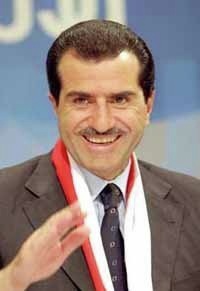
ليت الوزير فاروق الشرع يفهم ويقتنع بأن عهد الوصاية السورية على لبنان قد ولّى، وبأن اللبنانيين يعرفون مصلحتهم ويغارون عليها أكثر مما يغار عليها النظام السوري الذي يحاول اعادة عقارب الساعة الى الوراء من أجل معاودة وضع اليد على لبنان وفرض وصايته عليه بينما هدف اللبنانيين هو تحصين استقلال بلادهم وحماية سيادة وطنهم ووحدته بعد انتفاضة الاستقلال وانسحاب القوات السورية منه. ويا ليته ايضاً يدرك ان ما حصل في لبنان هو بمثابة العجيبة والانجاز الكبير، وأنه أمر ايجابي وليس سلبيا كما اعتبره في تصريحه الأخير في القاهرة. وحبذا لو يفسر لنا مفهومه للتدويل بعدما أبدى معارضته لما وصفه بـ"تدويل القضية اللبنانية". أليس مؤتمر مدريد تدويلاً لقضية الشرق الاوسط؟ ألا تعتبر القرارات الدولية الصادرة عن مجلس الأمن حول الصراع العربي – الاسرائيلي جزءاً من التدويل؟ والقمم التي عقدت بين سوريا والولايات المتحدة الاميركية أيام الرئيس حافظ الاسد لحل قضية الجولان، ألم تكن جزءاً من التدويل؟ والقرارات الدولية التي نطالب بتنفيذها يوما بعد يوم، أليست هي ايضا جزءاً من التدويل؟ وكيف يفسر الوزير الشرع اذن مشاركته ووجوده كممثل لنظامه، في اجتماعات مجلس الامن الدولي؟ ألا يعترف بمرجعية الامم المتحدة، أم يعتبر ان المرجعية الصالحة هي جامعة الدول العربية التي لم تتمكن ولا مرة من حل أي قضية عالقة عربية – عربية كانت أم عربية – دولية؟ وفي أي خانة يضع الوزير الشرع اعترافه بالقرار 1559 وتنفيذه واعتراف نظامه بالبند المتعلق بالقرارين 1595 و1636 وتنفيذهما؟ وماذا عن رفض نظامه استجواب الضباط السوريين في لبنان وقبوله استجوابهم في أوروبا؟ أليس هذا أيضاً جانباً من تأييد التدويل؟ فليفسّر لنا هذا الوزير "المحنّك" "حنكته" و"فذلكته" في ممارسته وممارسة نظامه السياسة الخارجية. ألا يعتبر هذا الوزير الموهوب أن في مواقفه تناقضات فاضحة، أم أنه يستغبي المجتمع الدولي والمجتمع العربي اللبناني الى حدّ الايحاء الى هذه المجتمعات انه وحده يفهم في السياسة الخارجية والعلاقات الدولية ومبادىء تطبيقها! فيا معالي الوزير، ان لبنان يقدّر اهتمام المجتمع الدولي بمساعدته عبر تطبيق قرارات مجلس الامن، وهو مع تحمل هذا المجتمع مسؤولياته عبر من هو مخوّل دوليا القيام بهذا الدور، أي مجلس الامن الدولي. وهذا الموقف ينطبق ايضا على تمسك لبنان بمطالبة المجتمع الدولي بتنفيذ كل قرارات الامم المتحدة العائدة الى الصراع العربي – الاسرائيلي. إلا اذا كان الوزير الشرع منزعجاً من التحول الذي حصل في السياسة الدولية بحيث أصبحت تقفٍ بجانب استقلال لبنان وسيادته، بينما الوزير الشرع لم يكن منزعجاً يوم أعطى المجتمع الدولي توكيلاً للنظام السوري ليحكم لبنان. يومها كان معالي الوزير ورئيسه مرتاحين للأداء الدولي، ومرتاحاً هو خصوصاً، لأنه كان يتكلم باسم لبنان ويقرر عنه داخل البلاد وفي المحافل الدولية! أما بعد، وفي قضية مزارع شبعا، ليت رئيس الخارجية السورية يفسّر لنا لماذا لا يريد أن يرسل وثيقة رسمية سورية الى الحكومة اللبنانية تعترف بها بلبنانية مزارع شبعا، مختصرا الاعتراف السوري بلبنانيتها بتصريح فارغ من هنا وتصريح من هناك؟ ولماذا يصر الوزير الشرع على ربط قضية المزارع بتحرير الجولان؟ فالجولان أرض سورية بينما مزارع شبعا أرض لبنانية. ولماذا يصر النظام السوري عبر وزارة خارجيته ورئيس حكومته على عدم ارسال تلك الوثيقة قبل انسحاب اسرائيل من المزارع؟ ولماذا الربط بين المسارين؟ ألا يعتبر الوزير الشرع ان هذه السياسة تخدم السياسة الاسرائيلية التي تحاول بشتى الطرق ابقاء احتلالها لكل الاراضي العربية التي سيطرت عليها في حرب 1967؟ فلبنان يا معالي الوزير يعتبر، على عكس ما تعتبره أنت، ان ارسال الوثيقة قد يساعد في تحرير المزارع. إلا اذا كنت أنت ونظامك لا تريدان لتلك المزارع ان تتحرر وتعود لبنانية، ولذلك تربطانها بتحرير الجولان، كي تبقى معلقة ومعها قضية ترسيم الحدود. ر بما لأن النظام السوري، أيها "الوزير المتذاكي" لا يريد ان يعترف بأن هناك حدوداً للبنان واضحة ومعترفاً بها دولياً. كما لا يريد ان يعترف بأن لبنان لم ولن يكون جزءاً من سوريا! من هذا المنطلق يصر لبنان على ان ترسل اليه سوريا الوثيقة الرسمية التي تعترف بها بلبنانية مزارع شبعا، كي يرسلها بدوره الى الامم المتحدة ليطالبها ويطالب المجتمع الدولي والولايات المتحدة، بأن تضغط على اسرائيل لتنسحب من منطقة مزارع شبعا المحتلة وتسلمها الى الامم المتحدة لتكون تحت وصايتها مرحليا حتى يتم ترسيم الحدود بين لبنان وسوريا وبمشاركة سورية رسمية وباشراف الامم المتحدة التي تكون وحدها مسيطرة على تلك المزارع، ليتم بعد ذلك تسليم المزارع الى السلطات اللبنانية واعتبار المساحات الاخرى بعد الترسيم والتابعة لسوريا خاضعة للقرارين 242 و338. لذلك فان ارسال الوثيقة هو الخطوة الاولى الضرورية من أجل بدء آلية تحرير المزارع واسترجاعها، بينما التأخر في تسليم الوثيقة او رفضه، تحت اي حجة كانت، يخدم اسرائيل ويكرّس احتلالها للمزارع. ان ما نريده هو احراج اسرائيل... لاخراجها. ولكن يبدو ان الوزير الشرع ونظامه لا يريدان احراج اسرائيل ولا اخراجها من المزارع، كي تبقى "قميص عثمان" وجرحاً نازفاً يستعمله النظام السوري في لعبة شد الحبال وسياسة الابتزاز. ان كل ما نسمعه عن ارادة النظام السوري مساعدة لبنان وفتح صفحة جديدة معه، هو كلام بكلام ان على مستوى مزارع شبعا، او على مستوى التحقيق في قضية اغتيال الرئيس رفيق الحريري. فعن اي ايجابية يتكلم الوزير الشرع عندما نرى ان هسام هسام فور عبوره الحدود السورية تبنته وزارة الاعلام السورية لاستعماله سلاحاً - ويا له سلاح فارغ وبال – ضد لجنة التحقيق الدولية وضد لبنان؟ أين التعاون بين سوريا ولجنة التحقيق الدولية؟ وأين جدية لجنة التحقيق السورية التي لم تستمع حتى اليوم الى هسام هسام، واذا ما استمعت اليه بعد اليوم فيكون ذلك مضحكاً ومن باب رفع العتب؟! وسوريا قد ترتاح للجنة التحقيق الدولية في حالة واحدة فقط هي ساعة يخرج القاضي ديتليف ميليس بنتيجة واحدة هي ان الرئيس رفيق الحريري "انتحر" ومعه باسل فليحان ورفاقهما، وكذلك سمير قصير وجورج حاوي، كما "انتحر" غازي كنعان. كما حاول مروان حماده ومي شدياق "الانتحار" ولم ينجحا. على اي حال ان آداء النظام السوري، منذ اللحظة الاولى لتأليف لجنة التحقيق الدولية، يدل على انه لا يريد التحقيق، بل يخافه لانه يخاف كشف الحقيقة التي قد تفضحه كي لا نقول تتهمه وتفضح أداءه السيئ في لبنان والمسيء اليه. ولا لزوم لديتليف ميليس من اجل كشف آداء النظام السوري الذي انكشفت حقيقته مع اكتشاف المقابر الجماعية في عنجر حيث كان مقر "المفوض السامي" و"الحاكم السوري للمقاطعة اللبنانية". فيا لها من قوة فصل وقوة سلام تلك التي تخطف وتسجن وتعذّب وتقتل وترمي في مقابر جماعية ضحايا بريئة تستصرخ الضمائر للاقتصاص من المجرمين. ثم يتكلمون على نكران للجميل وعن شكر لم نوجهه الى نظامهم! ولا حاجة هنا الى القول بأن التفسيرات السورية للمقابر الجماعية ساقطة، وخصوصاً عندما تحاول ربطها بـ"الحرب الاهلية اللبنانية". ولا جدوى ايضاً من محاولة هذا النظام وعملائه اعادة فتح ملف تلك الحرب لتغطية جرائمهم في حق اللبنانيين الابرياء. فالحرب اللبنانية طويت صفحاتها وصفحات الفظائع التي قامت بها الميليشيات والاحزاب عام 1990، مع اتفاق الطائف ولا عودة الى الوراء! اما المقابر الجماعية في عنجر فتشكل ملفاً مستقلاً ومنفصلاً. عما سمي "الحرب الاهلية اللبنانية". وهو ملف مرتبط مباشرة باداء جيش ومخابرات نظام كان يدعي انه لم يكن فريقاً بل كان حامياً للسلام، في حين انه كان بالفعل والحقيقة الحاكم السفاح الذي لا يرحم. ان مقابر عنجر الجماعية مسؤول عنها النظام السوري وحده. وهي جريمة في حق الانسانية وتستدعي تحركاً دولياً فورياً وتحقيقاً موسعاً ومحكمة ومحاكمة دوليتين، بمعزل عن جريمة اغتيال الرئيس رفيق الحريري وما سيؤدي اليه التحقيق الدولي في ما اعتبره المجتمع الدولي عملاً ارهابياً. وعلى النظام الامني السوري ان يعرف، ولا بد لوزير "الفذلكات" و"التناقضات" فاروق الشرع ان يكون قرأ في السياسة الدولية العصرية – كي لا نعود به الى القرون الوسطى - ان الانظمة المستبدة والطغاة الذين ارتكبوا مجازر في حق الانسانية لوحقوا وحوكموا وسقطوا! فالقتل والذبح والرمي في المقابر الجماعية ليست بالأمر المشروع حتى في أبشع الحروب... الا اذا كان أبطال تلك الحروب من سلالة الطغاة ولا لزوم هنا للتذكير بادولف هتلر ولا بتشاوشيسكو ولا بميلوسوفيتش ولا بصدام حسين ولا بزعماء القبائل في رواندا... عفواً معالي الوزير الشرع، فبين الولاء لسوريا والولاء للبنان، نحن اخترنا الولاء للبنان لمصلحته أولاً وتالياً لمصلحة سوريا!... اما عربياً فنحن دائماً مع قضايا العرب المحقة، وعلى رأسها القضية الفلسطينية وتحرير الجولان. اما الذين يختارون في لبنان الولاء لسوريا في مقابل الولاء للبنان، فنضعهم في خانة من لا يريد مصلحة لبنان ولا مصلحة سوريا، ويخدم بذلك اسرائيل عدوة لبنان وسوريا. فهل يفتش الوزير الشرع عن هؤلاء ليتحالف معهم؟ جبران تويني
نحو رؤية استراتيجية لبنا تشكل جسراً بين آسيا والغرب

هل تستمر الانتخابات اللبنانية "بلدية" في عهدة الرقابة الأوروبية التي أودعتنا صناديق اقتراع "رمزية" الشفافية حتى يرى كل ناخب منا كيف ان الورقة التي كتب عليها اسماً لن يفسح أمامه في مجال ممارستها. ... وتظل الاسماء مسمّرة في مكانها تنتظر ان تصنّف في الاستفتاء التي يريدونها ان تصير التعبير الدولي عنه الاكثرية "الحاكمة" التي ترعاها واشنطن بكثير من الخفر وهي تشدّها الى قمة غربية التوجه تريدها ان تكون موئل سلام الشرق الذي تمنع اسرائيل قيامه باستمرارها في معارضة دولة للفلسطينيين تشارك في قدسٍ غير مقتسمة تكون عاصمة الدولتين معاً، والعاصمة العالمية لكل الديانات السماوية. في نظرنا، لبنان هو الدولة العربية المؤهلة عضوياً بل كيانياً لأن تكون منطلق هذه الرؤية الاستراتيجية التي تنادي أوروبا لبنان لتعهدها توثيقاً لانتسابه الاوروبي. ووحده لبنان اذا فعل يمكنه ان يدعو في المقابل الى التجاوب مع القمة "الآسيوية" التي تدعو اليها ايران وترعاها موسكو باليد اليسرى وتحويلها من قمة حرب الى قمة تكامل السلام باستيعاب "حزبية الله" وتحويلها من الحرب على مؤمنين بالله اياه انما بغير تحزب، مما يمكّن القمة الآسيوية هذه من محاولة احتضان الموقف الباكستاني الداعي حتى بالعنف الى منع استمرار وانتشار الارهاب الاسلامي و"الطالبانية" كما لا احد ... غير الجبهة الباكستانية وامتداداتها الاستراتيجية المعلنة وغير المعلنة. ماذا يمنع بيروت من أن تتجرأ وتفاتح وزير خارجية الروسيا عندما يزورنا، إن لم تقنعه بالعدول عن زيارتنا، لسبب من عندياتها، ثم تبيع ذلك لواشنطن التي قد يناسبها الأمر في مقابل ثمن سوري ما! غسان تويني
وحياة اللي راحو واللي صارو الحنين
وحياتك يا أرضي و يا شعبي السجين
رح نرجع نتلاقى
رح نرجع نتوحد
وعد عليي
......يا رفيقي الشهيد
المجد والخلود لشهدائنا الأبرار. العزة والكرامة لشعبنا الابي،عاشت القوات اللبنانية، ليحيا لبنان
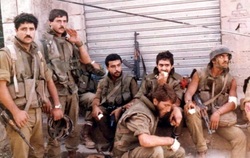
وحياة اللي راحو واللي صارو الحنين
وحياتك يا أرضي و يا شعبي السجين
رح نرجع نتلاقى
رح نرجع نتوحد
وعد عليي
...يا رفيقي الشهيد
وحياتك يا أرضي و يا شعبي السجين
رح نرجع نتلاقى
رح نرجع نتوحد
وعد عليي
...يا رفيقي الشهيد
كلما عتق النبيذ كلما صارت نوعيته افضل وهذا ينطبق على حزب الكتائب
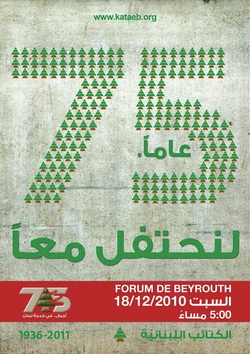
كلما عتق النبيذ كلما صارت نوعيته افضل وهذا ينطبق على حزب الكتائب
بشير حي فينا
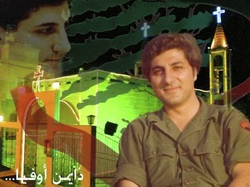
إلى القائد البشير ....
قائدي ورئيسي وملهمي...
كل يوم يمر بدونك معاناة تعمق شوقنا إليك
...
يزداد تعلقنا بك ويزداد شوقنا إليك بالوقت ذاته مع الأيام تتألق الأسطورة ويزداد الحلم
في حياتك كنت الواقع بل الواقع الوحيد وفي استشهادك اضحيت الحلم بل الحلم الأوحد
انطلقت شخصاً وامسيت تاريخاً
منذ طفولتك برزت معالم شخصيتك:إلهام القائد وإقدام البطل وطهارة القديس
تأمر فتطاع كنت دائماً مع الشعب تشارك في مشاكلهم تنزل إلى الشارع وتحس معهم...
ولدت كالاخرين عشت متخيراً واستشهدت فريداً
ابتكرت من العدم ومن اللاشيء عملت شيئاً متقدماً
على مثالك سائرون وعلى مثالك اختيرت الرجال
ورحت تزرع في كل قلب بشيراً
وفي كل ضمير بشيراً
وفي كل عقلاً بشيراً
فصرنا كلنا بشيريين بك ومن أجلك.
بشير حي فينا...
قائدي ورئيسي وملهمي...
كل يوم يمر بدونك معاناة تعمق شوقنا إليك
...
يزداد تعلقنا بك ويزداد شوقنا إليك بالوقت ذاته مع الأيام تتألق الأسطورة ويزداد الحلم
في حياتك كنت الواقع بل الواقع الوحيد وفي استشهادك اضحيت الحلم بل الحلم الأوحد
انطلقت شخصاً وامسيت تاريخاً
منذ طفولتك برزت معالم شخصيتك:إلهام القائد وإقدام البطل وطهارة القديس
تأمر فتطاع كنت دائماً مع الشعب تشارك في مشاكلهم تنزل إلى الشارع وتحس معهم...
ولدت كالاخرين عشت متخيراً واستشهدت فريداً
ابتكرت من العدم ومن اللاشيء عملت شيئاً متقدماً
على مثالك سائرون وعلى مثالك اختيرت الرجال
ورحت تزرع في كل قلب بشيراً
وفي كل ضمير بشيراً
وفي كل عقلاً بشيراً
فصرنا كلنا بشيريين بك ومن أجلك.
بشير حي فينا...
|…………………………....^....………………………….|
|………………………...|&&&|..………………………….|
|………………………|&&&&&&&|……………………….|
|………………….|&&&&&&&&&&&|……………………|
|…………………….|&&&&&&&&&|…………………….|
|…………………………/~~|~~\……………
Kataeb.org bachir-gemayel.org lebanese-forces.com
Bachirist J.B.M
| august_23_2010_9.jpg |
| august_23_2010_7.jpg |
| august_23_2010_6.jpg |
| august_23_2010_5.jpg |
| august_23_2010_4.jpg |
| august_23_2010_2.jpg |
| august_23_2010_1.jpg |
| me__bachir.jpg |
Nadim Bachir Gemayel
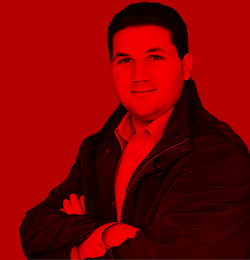
Country:LebanonCurrent OfficeOffice:Deputy of Beirut - Lebanese ParliamentState:BeirutDistrict:1Party:Lebanese KataebHometown:BickfayaBirthday:May 1, 1982
Website:http://www.NadimGemayel.comReligious Views:Christian - MaroniteAbout Me:Nadim Gemayel is a member of the Lebanese parliament (Beirut district – Maronite seat) since June 2009. He builds up on his father’s vision of a free and united Lebanon, adding his own patriotic and modern ideas to offer Lebanon and its people the long awaited rebirth through a sound state-of-the-art government. Nadim also strives for a sustainable and sincere partnership with the Arab countries, Europe and notably France in order to secure prosperity, peace and stability for Lebanon and the Middle East. On that front, he is a member of the Friendship Commission between Lebanon and France.
He is the son of former Lebanese President Bachir Gemayel, was born in 1982 (Bickfaya, Lebanon). He was four months old when his father was assassinated 27 years ago, on September 14, 1982.
Nadim is a member of the Political Bureau of the Lebanese Social Democratic Party (Al Kataeb - founded by his grandfather Pierre Gemayel in 1936), and heads the party’s Beirut District. He also co-chairs the Bachir Gemayel Foundation, an NGO founded in 1982 following the assassination of his father. The mission statement of the Foundation is to realize, spread and sustain Bachir’s spirit and ideology. It is promoted through social activities, scholarship granting and medical assistance offering.
Leader among Lebanese youth, Nadim’s struggle for freedom, notably against the Syrian occupation, began during his university years and culminated through the Cedars Revolution in 2005; he was at the forefront of Lebanon’s most significant demonstration leading to Lebanon’s second independence.
Nadim’s political action aims to guarantee protection of fundamental human rights and individual freedom for all Lebanese securing peace and equality, to achieve full independence of Lebanon from foreign nations that try to impose their influence via local allies and most importantly to help establishing the Lebanese state streamlining its administration and processes. He also fights for the unification of all weapons under the sole umbrella of the State.
Nadim obtained his law degree from the French University of Paris II – Assas in 2004 and joined the Beirut Bar in 2005.Nadim is an attorney at Badri and Salim El Meouchi Law Firm, working in Beirut but also in Doha (Qatar) where he has been actively involved in the establishment and development of the Qatar office since 2006.Education InfoCollege: Gender:MaleFacebook Page:http://www.facebook.com/Nadim.Gemayel
Email:[email protected]:+961 1 210452Screen Name:Beit Kataeb AchrafiehLocation:Sassine StreetBeirut, Lebanon
Website:http://www.NadimGemayel.comReligious Views:Christian - MaroniteAbout Me:Nadim Gemayel is a member of the Lebanese parliament (Beirut district – Maronite seat) since June 2009. He builds up on his father’s vision of a free and united Lebanon, adding his own patriotic and modern ideas to offer Lebanon and its people the long awaited rebirth through a sound state-of-the-art government. Nadim also strives for a sustainable and sincere partnership with the Arab countries, Europe and notably France in order to secure prosperity, peace and stability for Lebanon and the Middle East. On that front, he is a member of the Friendship Commission between Lebanon and France.
He is the son of former Lebanese President Bachir Gemayel, was born in 1982 (Bickfaya, Lebanon). He was four months old when his father was assassinated 27 years ago, on September 14, 1982.
Nadim is a member of the Political Bureau of the Lebanese Social Democratic Party (Al Kataeb - founded by his grandfather Pierre Gemayel in 1936), and heads the party’s Beirut District. He also co-chairs the Bachir Gemayel Foundation, an NGO founded in 1982 following the assassination of his father. The mission statement of the Foundation is to realize, spread and sustain Bachir’s spirit and ideology. It is promoted through social activities, scholarship granting and medical assistance offering.
Leader among Lebanese youth, Nadim’s struggle for freedom, notably against the Syrian occupation, began during his university years and culminated through the Cedars Revolution in 2005; he was at the forefront of Lebanon’s most significant demonstration leading to Lebanon’s second independence.
Nadim’s political action aims to guarantee protection of fundamental human rights and individual freedom for all Lebanese securing peace and equality, to achieve full independence of Lebanon from foreign nations that try to impose their influence via local allies and most importantly to help establishing the Lebanese state streamlining its administration and processes. He also fights for the unification of all weapons under the sole umbrella of the State.
Nadim obtained his law degree from the French University of Paris II – Assas in 2004 and joined the Beirut Bar in 2005.Nadim is an attorney at Badri and Salim El Meouchi Law Firm, working in Beirut but also in Doha (Qatar) where he has been actively involved in the establishment and development of the Qatar office since 2006.Education InfoCollege: Gender:MaleFacebook Page:http://www.facebook.com/Nadim.Gemayel
Email:[email protected]:+961 1 210452Screen Name:Beit Kataeb AchrafiehLocation:Sassine StreetBeirut, Lebanon
Bachir Gemayel
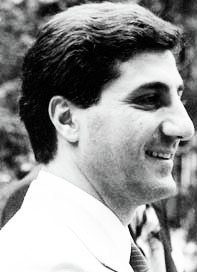
Website:http://www.BachirGemayel.orgRelationship Status:Married to
Solange TotounjiPolitical Views:ConservativeReligious Views:Maronite - ChristianEducation InfoColleges: High Schools: Gender:MaleFacebook Page:http://www.facebook.com/President.Bachir.Gemayel
Solange TotounjiPolitical Views:ConservativeReligious Views:Maronite - ChristianEducation InfoColleges: High Schools: Gender:MaleFacebook Page:http://www.facebook.com/President.Bachir.Gemayel
Nadim Gemayel, son of former Lebanese President Bashir Gemayel, was born in Bickfaya, Lebanon in 1982. He was 4 months old when his father was assassinated 26 years ago on September 14, 1982.
He received his law degree from the French University of Paris II – Assas in 2004, and currently practices law with a law firm which maintains offices in Lebanon and Qatar.
Nadim is a leading member of the Kataeb Party, which was founded by his grandfather Pierre Gemayel in 1936, serving as Vice President of the party’s Achrafieh District.
He serves as Co-Chairperson of the Bachir Gemayel Foundation, founded in 1982 following the assassination of his father, and which's mission statement is to spread Bachir’s spirit and philosophy of life, right to freedom and peace along with organizing social activities, scholarship and medical assistance.
A leader among Lebanese youth, Nadim’s struggle for freedom (notably against the Syrian Occupation) began during his university years and culminated in the Cedars Revolution of 2005, where he was at the forefront of Lebanon’s most significant demonstration, leading to Lebanon’s second independence.
His principal goals are to secure peace and equality for the Lebanese people; to guarantee protection of fundamental human rights and individual freedoms for all Lebanese; and to achieve full independence for Lebanon from foreign nations imposing influence via local organizations.
He shares among all the Lebanese youth, the responsibility to do his best efforts to spread the philosophy of life and the right to freedom and peace for all Lebanese people.
His father was assassinated for trying to free Lebanon from all foreign occupiers and to unify his people; his dream couldn’t be realized. This is why we are here, to work together with him, letting the world resemble to what we aspire to…
© Bachir Gemayel Foundation
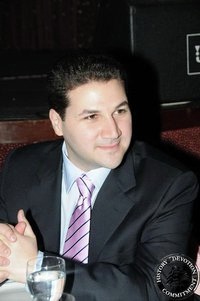
J.B.M
http://www.facebook.com/photo.php?fbid=106251282755812&set=a.133867153327558.21805.106208406093433#!/group.php?gid=361399333892
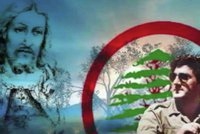
lamma l'bacccchhhhhhh .. Badlet l'ri2assi rtada... khitanha sarou nasij mnel houda.... w ta n2oul fi 3enna 7ada metlak mni7.... we7yat esm l'rabb ma 3enna 7ada...
http://www.facebook.com/photo.php?fbid=106251282755812&set=a.133867153327558.21805.106208406093433#!/pages/Bachir-7ay-fina-Official-page-/106208406093433
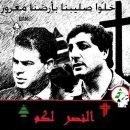
ياشهداء المقاومة اللبنانية نقسم بالله، نقسم بدمائكم الطاهرة إن حلمكم سيتحقق، لبنان سيّد حر مستقل. نقسم أننا باقون ومستمرون، لا يخيفنا سلاح العمالة ولا وطاويط الخيانة. باقون في جبالنا وسهولنا وودياننا، صامدون في قرانا ومدننا، ثابتون في أرضنا، مؤمنون
http://www.facebook.com/pages/Bachir-7ay-fina-Official-page-/106208406093433#!/pages/LBC-llqwat-allbnanyt/108448569210187
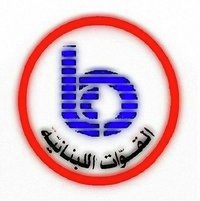
If This Page Reaches 100.000 We Will Get LBC Back !
**************
If u have any idea to Make this group Better...u can suggest anytime
****************
Invite Friends - Upload Pictures - Share Links - Start Topics
**************
If u have any idea to Make this group Better...u can suggest anytime
****************
Invite Friends - Upload Pictures - Share Links - Start Topics
طلما هنالك في السماء قوات ملائكية .... سيبقى على الأرض قوات لبنانية
ميلاد مجيد...
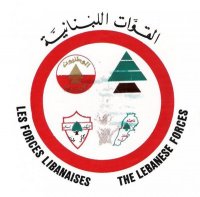
kataeb.org
www.lebanese-forces.com/
bachir gemayel.org/
www.lebanese-forces.com/
bachir gemayel.org/
mtv lebanon

mtv
_________†††††††_________
_________†††††††_________
_†††††††††††††††††††††††_
_†††††††WATANOUNA†††††_
_†††††††††††††††††††††††_
_________†††††††_________
_________WA FIHI_________
_________†††††††_________
_________†††††††_________
_________†††††††_________
_________BAKOUN________
_________†††††††_________
_________††††††__________
_________†††††___________
_________††††____________
_________†††_____________
_________††______________
_________†______________
________†______________
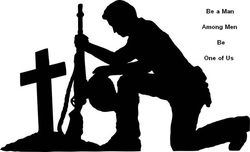
ضلوا صلوا يا أخوان عن أرواح اللي غابوا
غابوا تا يبقى لبنان بشعبو بأرزو وبترابو
هالأحتلال ليزول بدوا دم...
هالأحتلال ليزول بدوا شباب تزيلوا...
وبدوا شباب تريجع السوري على سوريا...
...
والفلسطيني يروح يفتش على وطن تاني يستوطن في
غابوا تا يبقى لبنان بشعبو بأرزو وبترابو
هالأحتلال ليزول بدوا دم...
هالأحتلال ليزول بدوا شباب تزيلوا...
وبدوا شباب تريجع السوري على سوريا...
...
والفلسطيني يروح يفتش على وطن تاني يستوطن في
